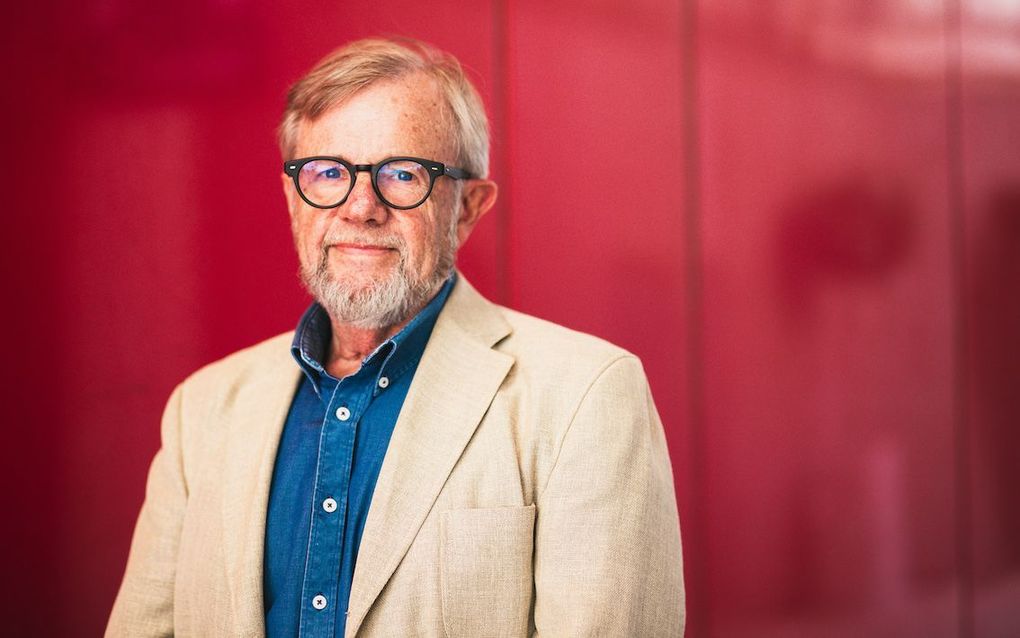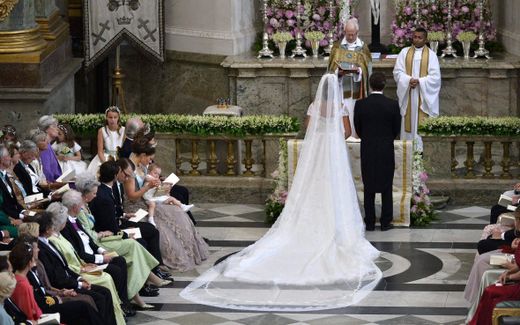Debate among fellow-Pentecostals after "heretical" book about gay relations

Prof. Terje Hegertun. Photo Verbum forlag, Dan Aksel Jacobsen
Opinion
What would be the essence of Christian marriage? That you love each other and that you are from the opposite sex? The Norwegian Pentecostal theologian Terje Hegertun focuses on something else: being faithful. When two men love and respect each other and remain loyal, this could not be contrary to God's creative will.
With his new book "Det trofaste samlivet" (The faithful living-together), Prof. Hegertun contributes to a debate that is going on almost everywhere among Christians in Western countries. That doesn't say that this view is generally accepted. On the contrary, this book caused a storm in the family of free churches in Norway.
In this book, Hegertun concludes that the Biblical basis for marriage is not the gender polarity of male and female. In other words, Christians can join the gender-neutral version of marriage of modern times.
The author is a theology professor at the MF Norwegian School of Theology, Religion and Society, an independent university in Oslo. But he still is a key figure in the Pentecostal circles in Norway. He started his career as a minister and served many years as the managing editor of the church magazine "Korsets Seier" (Victory of the Cross). For some years, he was president of the Pentecostal leadership council. He still is a member of the Filadelfia Church in Oslo, of which his son Andreas is the minister now. In 2009, he wrote a PhD thesis published in English as "Spirit and Church: signs of God's graceful Presence".
Another view on Romans 1
For his new book, Hegertun studied all the Bible texts about marriage and (homo)sexuality. That's how he came to his conclusions.
After publication, most attention goes to his interpretation of Paul's words about homosexuality in Romans 1. There the apostle speaks about "dishonourable passions", "relations contrary to nature", and "men committing shameless acts with men".

Hegertun accepts those words as part of the Holy Scriptures, but he says this has nothing to do with civilised lovers' "faithful cohabitation". The Bible here condemns the im-pure and un-equal sexual acts, as the promiscuity between a married master and his slaves, which was not uncommon in the Greek-Roman world. According to the Norwegian professor, the present-day concept of same-sex marriage of two free and equal partners was unknown to Paul. And therefore, it would be wrong to conclude from Romans 1 that "faithful cohabitation" would be beyond God's will.
"I have read a lot of literature and have looked at the context in which the [Bible] texts are written", Hegertun says in the daily Dagen. "This is one of the reasons why I ask whether it is so relevant to compare these with faithful gay relationships that are built on faithfulness and love. It is awkward to put this in the same box as behaviour that allowed a Roman citizen to rape a male slave."
Christian gays are no pagans
Hegertun's conclusion is clear: the Biblical concept of marriage is open for people of equal gender too. "The homosexuals who today profess faith in Christ and who are disciples of Jesus are not examples of a pagan way of life (as in Romans 1), but of a Christian life", Hegertun writes in "A letter to my people" in Dagen.
Gay people have their own heterosexual parents as a role models for their dream of a good life, Hegertun writes. In those new relationships, he sees a reflection of Micah 6 verse 8: doing justice, loving kindness and walking humbly with God. This is quite a classical approach to relationships, according to the Norwegian professor.
Pentecostals support traditional marriage
The book gives a follow-up to a debate that has been in the Norwegian churches for decades. The Church of Norway, the former state church, accepted homosexuality long ago and celebrates gay marriage since 2016. Within the more conservative Bible-believing free churches, of which the Pentecostals are the main denomination, this has never received broad support. In 2018, the Pentecostals re-affirmed that marriage is a lifelong male-female relation.
Hegertun explicitly says that he wants to write in the present-day context of the Norwegian free churches out of pastoral concern. His whole life, he saw that gay Christians wrestle with their orientation. Sometimes they decide to remain celibate. In other cases, they leave to other denominations that accept the homosexual lifestyle. But Hegertun also knows about people with a secret double life.
Because of this, he sought contact with the Norwegian organisation of gay Christians, Skeivt Kristent Nettverk. From them, Mr Hegertun experienced how deep their pain is. He concludes a strong lack of sensitivity for people of the 'other' orientation in the free churches. The author intends "to build bridges" between conservatives, gay people, and the broader society.
Much space for negative stories
Hegertun's book confirms the position of the Church of Norway, which has accepted same-sex marriage as an option for Christian people. Many people responded delightedly because they feel this as an affirmation of their own convictions or feelings. The media gave much space to the negative experiences of homosexuals from a Christian background.
But the more Evangelical circles, of which Hegertun is part himself, experience this as an attack. The Christian daily Dagen wrote an editorial under the headline: A theological wreck. The other Christian daily, Vart Land, however, responded that this editorial was far too personal and too less focussed on the content of the book.

Numerous subscribers sent contributions to these newspapers. For instance, Jan Bygstad, who represents the organisation FBB (Bible and confession). He admits that many gays "have been met with ruthlessness". But he distances himself firmly from Hegertun's approach. That one pardons sin, instead of the sinner, he says with a little wink to Bonhoeffer.
Marriage is about procreation
An author who published about homosexuality earlier, Espen Ottosen, responded very disappointed. He says that Hegertun defends a very weak "liberal position". The concept of sexual orientation would be more Western than Biblical. Apart from that, he can't understand that Hegertun doesn't value the procreation perspective as central for the marriage concept, Ottosen says in Dagen. Ottosen is the spokesperson of the Norwegian Lutheran Mission.
A Pentecostal brother of Hegertun, Oyvind Gaarder Andersen, thinks the Christian church can't combine two visions on marriage. "This is a matter of Biblical faithfulness", he says in Dagen. He concludes that Hegertun's vision is a "heresy that will split the Pentecostal movement".
Other critics say that Hegertun embraces the central dogma of the LGBT movement by ignoring that the gender aspect is fundamental in creation. Some also ask why being faithful should be limited to two people if the same loyalty could function in polyamorous relations as well.
Hegertun opens a door
Skeivt Kristent Nettverk writes in a letter in the two Christian newspapers in Norway, Dagen and Vart Land, under the headline: Dear Terje, thank you very much. The letter says that "we are followers of Jesus who live our whole life with whom we love", as chairwoman Elisabeth Meling states. "You take our experiences seriously, and that is something we have missed in the free churches for quite some time. (…) We haven't chosen our orientation ourselves, and we don't choose what sex we feel attracted to. (…) You open a door of which we thought it would remain closed forever."
Several critics say that there is historical evidence that there were even homosexual marriages in the apostolic times. Gaarder Andersen writes that in Dagen. Given that St. Paul was very well aware of what was going on in the Greek-Roman culture since he stayed in multiple large cities, it would be unlikely that he was not aware of this.
In an exchange of letters with Gaarder Andersen in Dagen, Hegertun responses that there were "marriage-like relationships between men" but the "dominant picture" of homosexuality was that of power abuse and role transgressions. In a final answer, he states that it is "primarily the promiscuous homosexuality of which Paul distances himself from, as Biblical ethics also does when it comes to sexual expression in general". In contrast to that, the "Christian homosexual has on other desire than to live ethically responsible in a monogamous relationship and submits to the same ethical criteria that apply to any other binding cohabitation relationship."
Hegertun answers yesterday's question
In his review of Hegertun's book in Vart Land, Espen Ottosen asks whether the focus of this new book is not somehow out-of-date. Nowadays, the debate is not so much about sex but more about gender and gender reassignment. The question is more whether sex exists at all since you can choose a third option apart from male or female.
In interviews with the two Christian daily newspapers, Dagen and Vart Land, Mr Hegertun stresses that he is still a "conservative theologian who wants to preserve the best of the classical tradition". He wants to have an "intermediate position" between traditionalists and progressives.
Lesbian lifestyle separated from God
In the midst of this heated debate around Hegertun's book, Dagen published an interview with the 68-year-old Karen Graaten. This Christian woman had lived in a lesbian bond for years. "But eventually, I noticed something was separating me from God. The presence of God gradually disappeared", she tells. And she realised what it was: the lesbian sexual activity.
She stepped out of this relationship and stopped the lesbian lifestyle. After this, she found peace. "As a Christian, I have my identity not in my feelings or my sexuality, but in the new life with Jesus", she explains.

Vart Land published an interview with Bjorn Helge Sandvei, a gay who decided to stay alone. After his coming out in 2009, he only received negatives reactions from liberal theologians. "They were offended. It was as if they said: Here we have opened possibilities, but you say no thank you."
For him, it is clear that Paul knew what he was writing about in Romans 1. But also, during the apostolic times, believers were different from the main culture. "The Christians were seen as weirdos when they insisted on sticking to one woman and abstaining from homosexual cohabitation. But despite of the opposition from society, the Christians stuck to this way of thinking about sexual life." Sandvei thinks that is the Christian lifestyle for the 21st century as well.
Many churches have split
In many countries, the issue of same-sex marriage is highly controversial for Christians. On the one hand, conservatives say that male-female comes directly from the creation order in Genesis 1 and state that bridegroom and bride reflect Christ and the church (as in Ephesians 5). On the other hand, homosexuals claim that God has created them with their identity or orientation. They want to enjoy a stable relationship, equal to heterosexuals. The Roman Catholic Church still has one official position. Still, this position is provoked in many church provinces, especially in Europe. Several Protestant churches have been split or are about to split about this issue.
Related Articles






